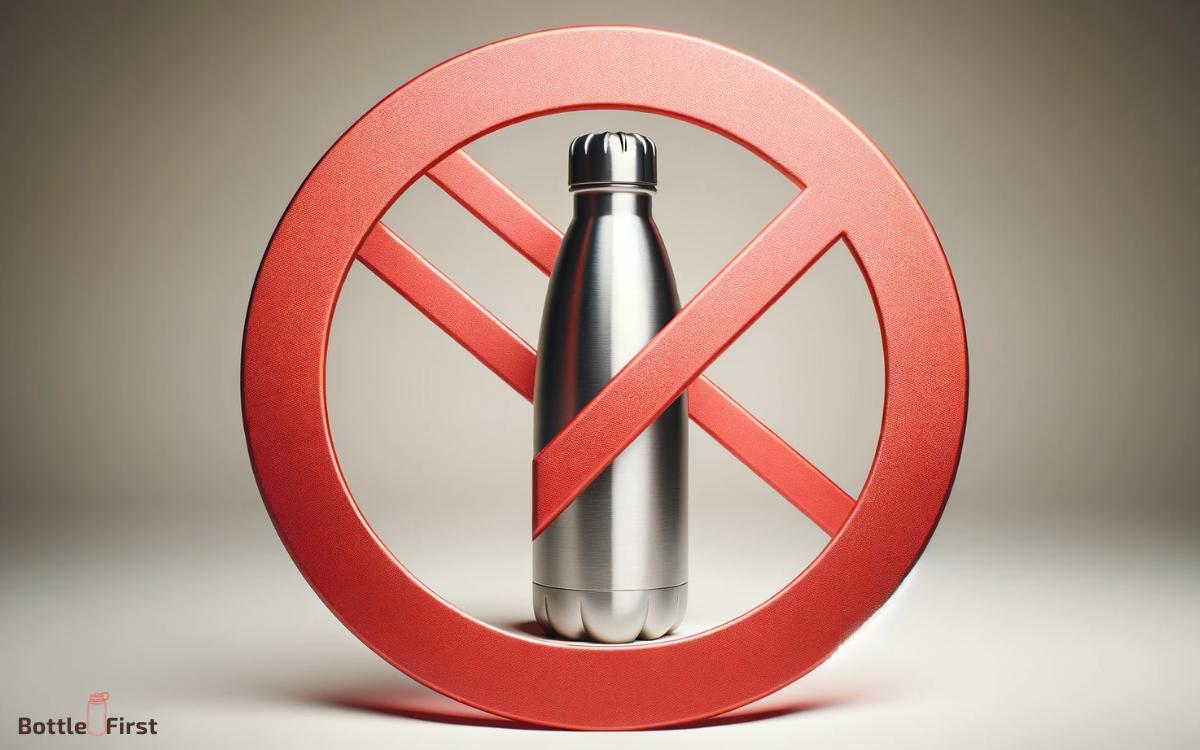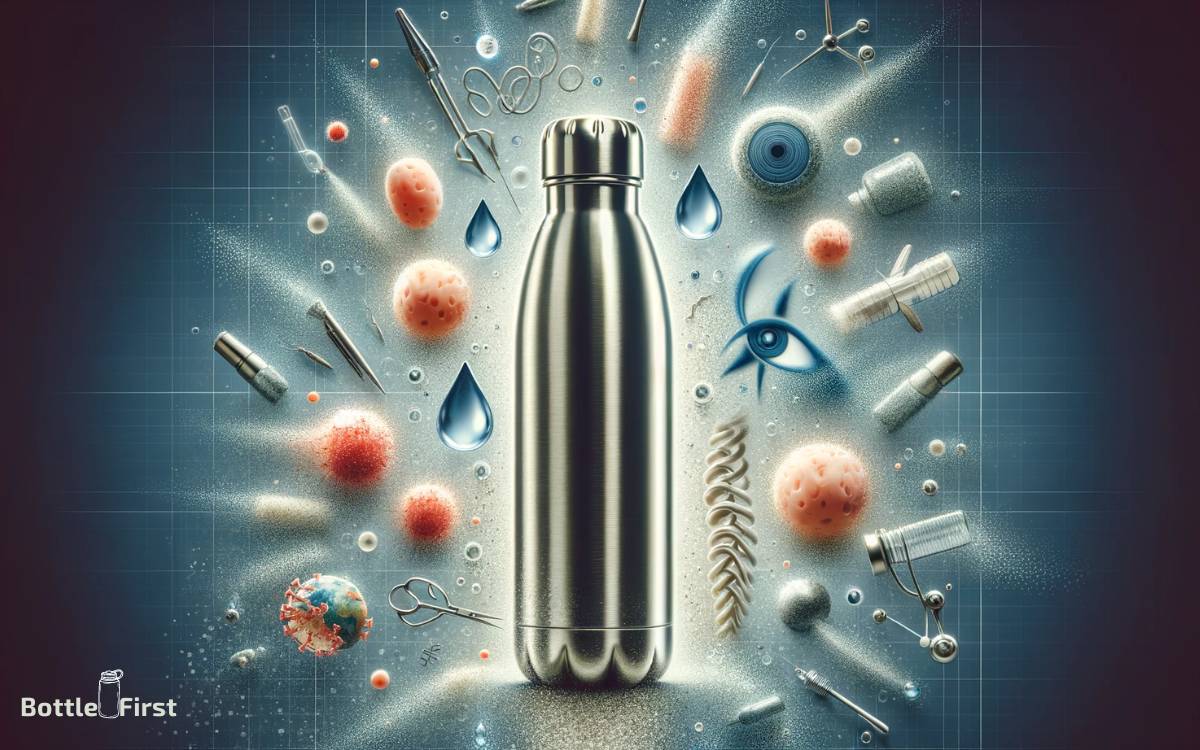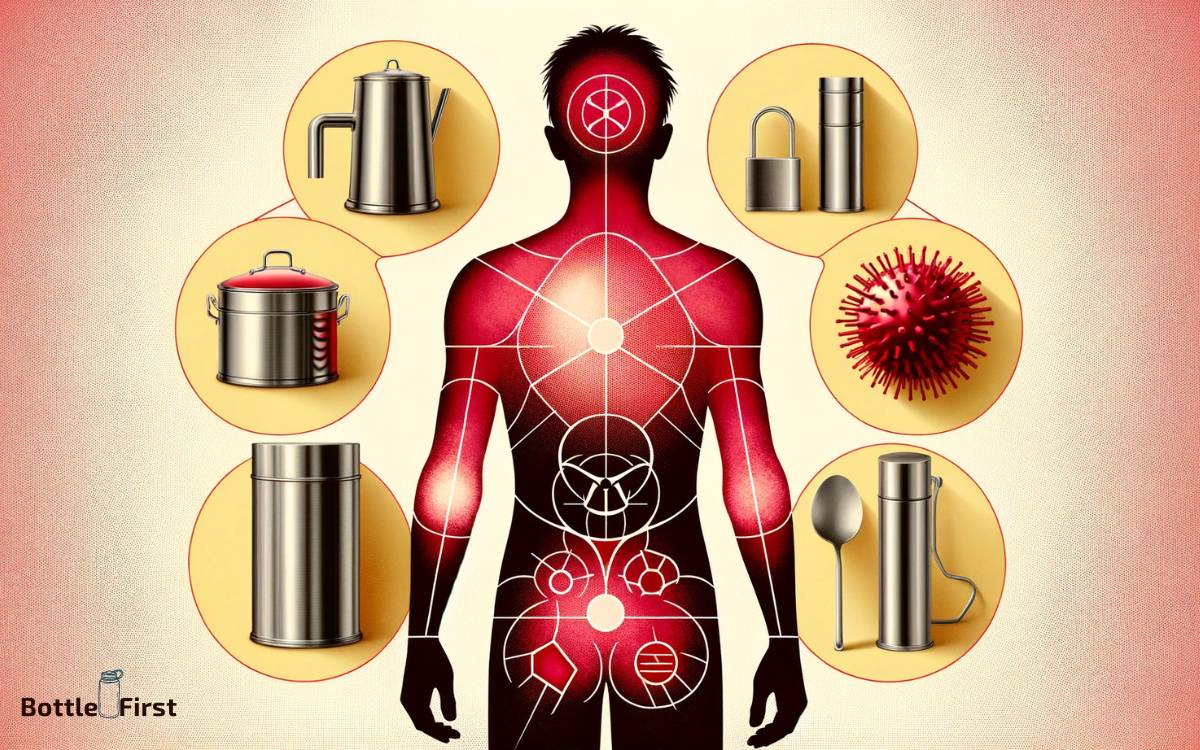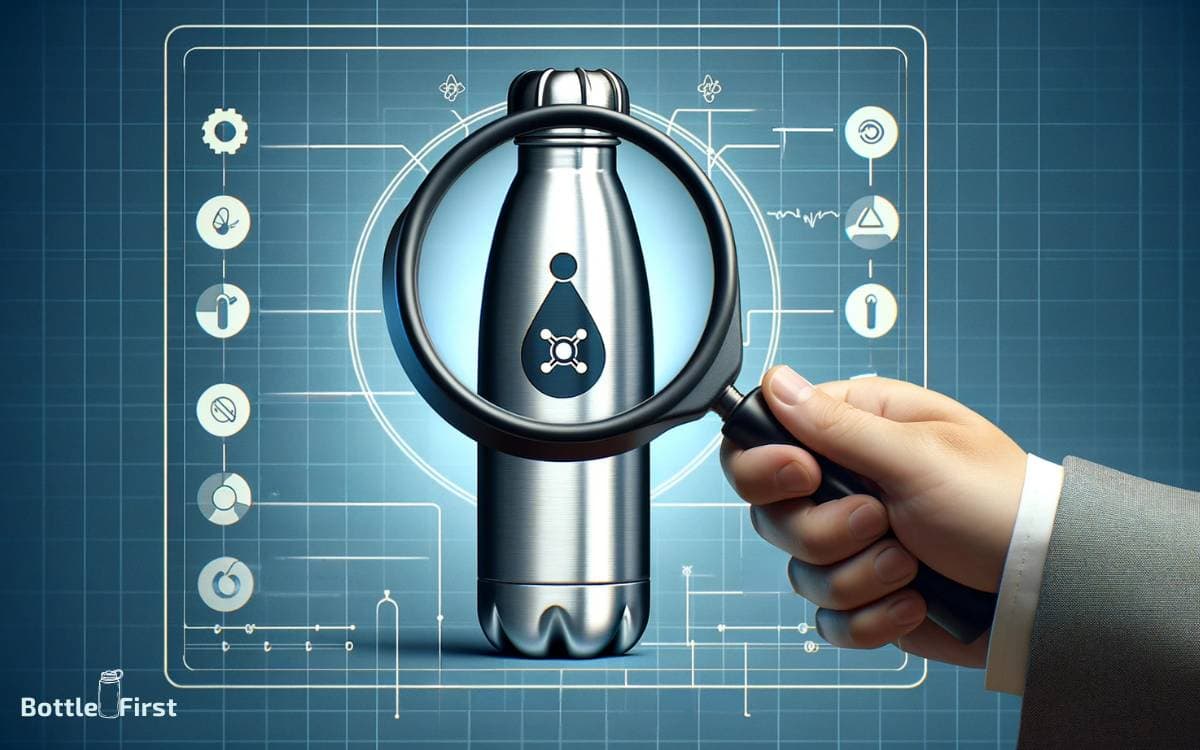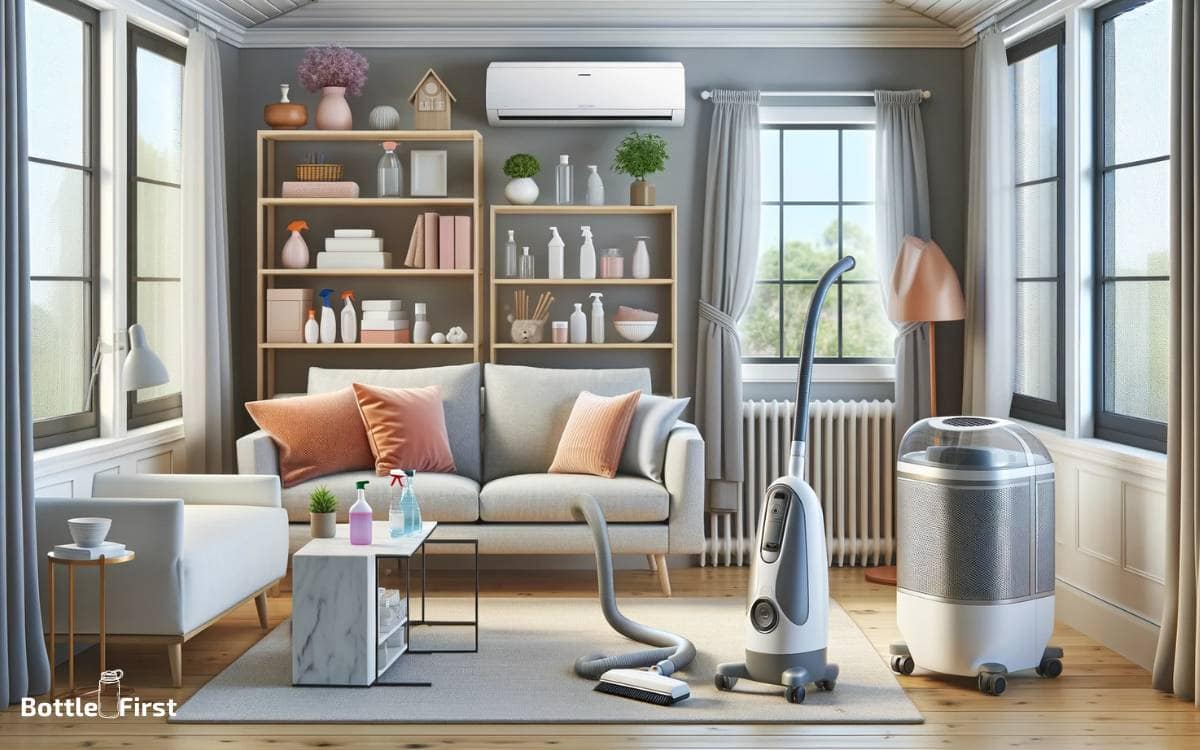Allergy to Stainless Steel Water Bottle: Explained!
Experiencing an allergic reaction to your stainless steel water bottle is possible due to nickel sensitivity. Stainless steel contains varying amounts of nickel, which can trigger allergic reactions in some individuals.
When someone with a nickel allergy comes into contact with stainless steel containing nickel, their immune system may react, leading to symptoms like:
To identify if a stainless steel item contains nickel, you can use a nickel test kit, which includes a solution that changes color when it comes into contact with nickel.
Identify and manage a nickel allergy effectively to ensure your hydration needs are met without discomfort or health risks.
If you’re experiencing discomfort or a rash from using a stainless steel water bottle, it might be due to a nickel allergy.
Key Takeaway
Understanding Stainless Steel Allergies
If you experience skin irritation or rashes after using stainless steel products, you may have a stainless steel allergy.
It’s not uncommon, and it doesn’t mean you’re alone in this. Many people, just like you, have found themselves dealing with similar issues.
Understanding stainless steel allergies is essential for finding a sense of belonging and knowing that your experience is valid.
You might feel frustrated or confused, but knowing that there are others who can relate can bring comfort. It’s important to seek out information and support from the community.
By educating yourself and connecting with others who share similar experiences, you can navigate this challenge and find a sense of belonging within a community that understands and supports you.
Common Symptoms of Allergic Reactions
If you develop a skin rash or itching after using a stainless steel water bottle, it might be a sign of an allergic reaction. Swelling and redness in the area of contact are also common symptoms to look out for.
These symptoms can vary in severity, so it’s important to monitor your body’s response and seek medical attention if necessary.
Skin Rashes and Itching
You may frequently experience skin rashes and itching as common symptoms of allergic reactions to stainless steel water bottles. The nickel and chromium in the stainless steel can trigger an immune response, leading to red, itchy rashes on your skin.
These rashes may appear where the bottle comes into contact with your skin, such as your hands, mouth, or neck.
The itching can be quite intense and uncomfortable, causing you distress and discomfort. It’s important to recognize these symptoms as potential signs of an allergic reaction to the materials in the water bottle.
If you notice these symptoms persisting or worsening, it’s advisable to discontinue the use of the stainless steel water bottle and consult a healthcare professional for further guidance on managing your allergy.
Swelling and Redness
Experiencing swelling and redness can often accompany the itchy rashes caused by your allergic reaction to stainless steel water bottles. These symptoms are common indicators of an allergic response in the body.
The swelling occurs as your immune system releases histamines, causing blood vessels to expand and fluid to accumulate in the affected area. This leads to noticeable swelling and puffiness, particularly around the lips, face, hands, and feet.
The redness is a result of increased blood flow to the affected skin, causing it to appear redder than usual.
It’s important to recognize these symptoms as potential signs of an allergic reaction to stainless steel water bottles and seek medical advice if you experience them.
Taking prompt action can help alleviate discomfort and prevent the allergic reaction from escalating.
Identifying Nickel in Stainless Steel
If you suspect that your stainless steel water bottle is causing an allergic reaction, it’s important to consider the possibility of nickel being the culprit.
Nickel is a common component in stainless steel and can trigger allergic symptoms in some individuals.
Understanding how to identify nickel in stainless steel and exploring nickel-free alternatives can help you find a suitable and safe water bottle option.
Nickel Allergy Symptoms
When identifying nickel in stainless steel, it’s important to be aware of the common symptoms of nickel allergy.
Nickel allergy symptoms may include:
- Skin redness, itching, and rash upon contact with nickel-containing items such as stainless steel water bottles.
- Swelling, tenderness, and blistering at the site of contact with nickel.
- In severe cases, a person with a nickel allergy may experience respiratory problems, such as wheezing and shortness of breath, after inhaling nickel particles from stainless steel items.
If you suspect that you have a nickel allergy, it’s essential to seek medical advice for proper diagnosis and management.
Avoiding direct skin contact with nickel-containing materials, including stainless steel products, can help alleviate symptoms and prevent allergic reactions.
Testing Stainless Steel
To determine if your stainless steel water bottle contains nickel, use a nickel testing kit to identify the presence of this metal.
These testing kits are readily available and easy to use. Simply follow the instructions provided with the kit to conduct the test.
Typically, the process involves applying a drop of testing solution to the surface of the stainless steel. If the solution changes color, it indicates the presence of nickel.
This simple test can provide valuable information about the composition of your water bottle and help you determine if it may be causing your allergic reactions.
Nickel-Free Alternatives
To identify nickel in stainless steel, consider using a nickel testing kit to determine its presence.
If you’re looking for nickel-free alternatives, here are some options to explore:
- Look for stainless steel labeled as ‘nickel-free’ or ‘low nickel.’
- Consider using water bottles made from alternative materials such as glass or BPA-free plastic.
- Explore other metal options like titanium or aluminum for a durable and safe water bottle choice.
It’s important to find a water bottle that not only meets your needs but also aligns with your allergy concerns.
By being aware of nickel content and exploring alternative options, you can find a water bottle that makes you feel comfortable and confident in your choice.
Coping Strategies for Allergy Sufferers
Using stainless steel water bottles can be challenging for allergy sufferers, but there are coping strategies that can help you manage your symptoms effectively.
Firstly, consider using a protective barrier, such as a silicone sleeve, to create a barrier between the bottle and your skin. This can help reduce direct contact with the metal and minimize the risk of a reaction.
Additionally, regularly cleaning the bottle with mild soap and water can help remove any potential allergens that may have accumulated on the surface.
It’s also important to stay hydrated, so if stainless steel bottles aren’t an option for you, consider alternatives such as glass or BPA-free plastic bottles.
By implementing these coping strategies, you can still enjoy the convenience of a reusable water bottle without compromising your health.
Next, let’s explore alternative options to stainless steel water bottles.
Alternatives to Stainless Steel Water Bottles
Where else can you find a suitable replacement for stainless steel water bottles if you have an allergy to them?
There are a variety of alternative options that you can consider:
- Glass Water Bottles: These are a great alternative to stainless steel and are non-reactive, making them suitable for those with allergies.
- BPA-Free Plastic Water Bottles: Look for bottles made from BPA-free plastic to ensure they’re safe and suitable for those with allergies.
- Copper Water Bottles: Copper bottles not only offer an alternative to stainless steel but also have antimicrobial properties that can be beneficial for your health.
Consider these alternatives to find a suitable replacement for your stainless steel water bottle and continue staying hydrated without any allergic reactions.
Seeking Professional Medical Advice
Wondering if your symptoms may be related to an allergy to stainless steel water bottles? It’s important to seek professional medical advice if you suspect that you may be experiencing an allergic reaction.
Consult with an allergist or dermatologist who can help determine the cause of your symptoms and provide guidance on the best course of action.
They can conduct allergy testing to identify potential triggers and offer personalized recommendations for managing your condition.
Additionally, they can offer advice on alternative materials for water bottles or other lifestyle adjustments to minimize your exposure to potential allergens.
Seeking medical advice won’t only help address your current symptoms but also provide valuable insights for preventing future allergic reactions.
Your health and well-being are important, so don’t hesitate to reach out to a medical professional for assistance.
Tips for Managing Allergies at Home
If you suspect an allergy to stainless steel water bottles, you can manage your symptoms at home by taking simple precautions.
Firstly, consider switching to a glass or BPA-free plastic water bottle to avoid contact with stainless steel.
Keeping your home environment clean and dust-free can also help alleviate allergy symptoms. Regularly dusting and cleaning surfaces can minimize exposure to potential allergens.
Additionally, using a HEPA air purifier can help reduce airborne allergens, providing relief from symptoms.
Creating an allergen-free zone in your home, especially in the bedroom, can significantly improve your overall well-being.
Conclusion
So, if you’ve been experiencing unexplained skin irritation or itching, it might be time to consider the material of your water bottle.
While stainless steel is a popular choice for many, it can cause allergic reactions in some individuals.
But don’t worry! There are plenty of alternatives available to keep you hydrated without the discomfort.
Remember, taking care of your health is always a priority, so choose the best option for you.
